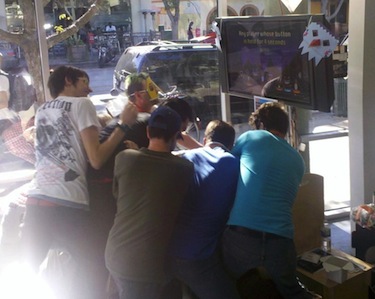The Independent Video Game Takeover: Indiecade 2010

There was an invasion in Southern California Oct. 8-10, and I’m not talking about the zombies that were roaming the streets.
The invasion was staged on a 4-square-block reigon of Culver City, where independent video game developers gathered for the International Festival of Independent Games: Indiecade.
If you were seeking a ruthless, mindless, violent and gore-ridden video game where gallons of blood purge the streets of some nameless destitute city, Indiecade was the wrong place to go.
However, if what you were looking for was a game where the innovative, intuitive design enclosed you in an entertaining world of wonderful, different new ideas, the selection was virtually infinite.
Of the 32 games featured, three really caught my attention: B.U.T.T.O.N., Retro/Grade, and The Games of Nonchalance.
B.U.T.T.O.N., which stands for “Brutally Unfair Tactics Totally Okay Now,” was a party game that crawled out of the Denmark-based game-making organization, Copenhagen Game Collective. This game ditches the intricate controls of a standard Xbox controller, giving each player one button, which he or she is supposed to press.
Players must follow the instructions on the screen, which range from “Act like a Pirate,” to “Hum like a bee,” to “Hold hands with the player standing next to you,” to my personal favorite: “Turn around, sit down, and close your eyes.”
Then, after a short countdown, all of the players must rush to the buttons and satisfy a certain win condition, such as being the first player to hold their button down for five seconds.
The genius of this game comes in its simplicity, and as a result of its bringing the competition into the physical world. At a party, as one of the developers put it, “really what you want to do is push your friends around, do something stupid, and make your friends do something stupid too.”
The result was astounding: a game that could be enjoyed by just about any group of friends at any kind of social event: a truly universal kind of entertainment.
Retro/Grade, a PS3 console game making use of the popular Guitar Hero controller, is a brilliant combination of stunning graphics, pulsating beats and creative genius.
The game works like this: you move a spaceship between lines of enemies, replaying an epic space-battle in reverse in order to repair the space-time continuum.
After two years of work on this game, the developer Twenty Four Caret Games plans on releasing it to the PlayStation Network sometime in 2011.
A breath of fresh air to the increasingly stale world of commercial video-game production, Retro/Grade proves to be an entertaining combination of ingenuity and classic aspects of explosive entertainment, all with a brilliantly designed and animated space-world within which to play.
One game in particular, however, seemed to stand out in its freshness and brilliance. However, you won’t find a DVD which holds The Games of Nonchalance for sale anywhere: in fact, nobody can currently play it who doesn’t live in San Francisco.
The Games of Nonchalance is a product of the minds of Jeff Hall, Sarah Thatcher and Uriah Thinley. The goal of this game: to entertain players whilst “giving people a different view of their city.”
The reason for the exclusivity of The Games is because you can’t play it on any console sold today, you can't purchase it for a computer and you can't find it on the board-game aisle of Barnes & Noble.
It is a game where the characters of the story are the players themselves, the board is the city of San Francisco, and the world of the game is the very world which we humans inhabit.
Following the story of the Jeujeune Institute, players experience a sort of real-life video game, where they are sent on quests to different areas in San Francisco, to find clues which leads them on their next quest, creating a delicately, intriguing, well-threaded story.
The real-life adventure is about two years old, and it currently has two functional “episodes.” It has been “completely done” for about eight months, and averages around 1,000 players per month.
Despite the difficulty and cost of maintaining a video-game set in real-life, the game is currently free to play, unless one wishes to set up a reservation. In fact, other than reservations, the only source of funding that The Games receives is through the sale of small items necessary for the completion of a story, such as a $10 CD and a map.
An afternoon at Indiecade provided me with a revelation that the idea of the video game is a versatile one, with no limits in its structure, design or implementation. There is no tried-and-true formula to video games, just as there is none for literature, film, or music. The world of video games is one that embraces variety, creativity and ingenuity.
The outcome of such a cultivation of innovation is simple: truly entertaining, truly brilliant, and, above all, truly epic sources of entertainment, inspiration, and even art.
Stay tuned for more of my revelations from IndieCade throughout this week.
Reach reporter Devon Meyer here.
Follow him on Twitter: @DMeyer212.



